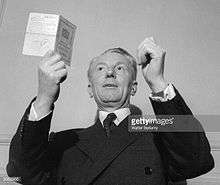Clarence Harry Willcock

Clarence Harry Willcock (23 January 1896 – 12 December 1952) a member of the Liberal Party, was the last person in the UK to be prosecuted for refusing to produce an Identity Card.
Compulsory identity cards had been re-introduced during World War II under the National Registration Act 1939. After the War the Labour government of Clement Attlee decided to continue the scheme.
On 7 December 1950, Harry Willcock, a 54-year-old dry-cleaning manager of Hadley Wood, was stopped while driving in Finchley, London, by police constable Harold Muckle, who demanded that Willcock present his identity card at a police station within 48 hours. He refused, reportedly saying "I am a Liberal and I am against this sort of thing". He was prosecuted under the National Registration Act 1939, convicted and fined 10 shillings. During his trial he argued that identity cards had no place in peace time.
In his subsequent appeal, Willcock v Muckle,[1] Willcock's defence team was made up of prominent Liberals including Archibald Pellow Marshall KC, Emrys Roberts MP, and Basil Wigoder, who offered their services free. The judgment of the lower court was upheld, although in summing up the Lord Chief Justice of England and Wales, Lord Goddard showed sympathy for the defence:
- "This Act was passed for security purposes, and not for the purposes for which, apparently, it is now sought to be used. To use Acts of Parliament, passed for particular purposes during war, in times when the war is past, except that technically a state of war exists, tends to turn law-abiding subjects into lawbreakers, which is a most undesirable state of affairs. Further, in this country we have always prided ourselves on the good feeling that exists between the police and the public and such action tends to make the people resentful of the acts of the police and inclines them to obstruct the police instead of to assist them."
As a result of the court case, Willcock became well-known and he founded the Freedom Defence Association to campaign against ID cards. In a publicity event he tore up his own identity card in front of the National Liberal Club, inspiring in April 1951 a similar action for the press outside Parliament by the British Housewives' League.
After the defeat of the Labour Government in the general election of October 1951, the incoming Conservative administration of Winston Churchill was pledged to get rid of the scheme; 'to set the people free', in the words of one minister. On 21 February 1952 the Minister for Health, Harry Crookshank, announced in the House of Commons that national identity cards were to be scrapped. This was a popular move, adopted against the wishes of the police and the security services.
When identity cards were abolished Willcock received hundreds of redundant cards through the post to auction for charity.
Willcock was the Liberal candidate in Barking in 1945 and in 1950. He came third in both contests, losing his deposit in 1950. He had previously been a councillor and magistrate in Horsforth, Leeds.
Willcock was born in Alverthorpe, Wakefield, Yorkshire, the son of Harry Cruickshank, a native of Leeds who worked in the textile trade, and Ella Brooke, whose family ran a wholesale tailoring business. He died suddenly while debating at a meeting of the Eighty Club at the Reform Club.[2] The last word on his lips before his death was reported to have been "freedom."
See also
References
- ↑ http://lrm.stormpages.com/WvM1951.html
- ↑ "Harry Willcock" The Scotsman 14 June 2006; location confirmed by 1953 National Probate Calendar
External links
- "Policing by plastic" by Alan Travis; The Guardian, 30 May 2003
- "Harry Willcock: the forgotten champion of Liberalism" by Mark Egan in Journal of Liberal Democrat History; issue 17, Winter 1997
- Liberal Democrat leader Nick Clegg MP on why Willcock is one of his personal heroes, 29 October 2009